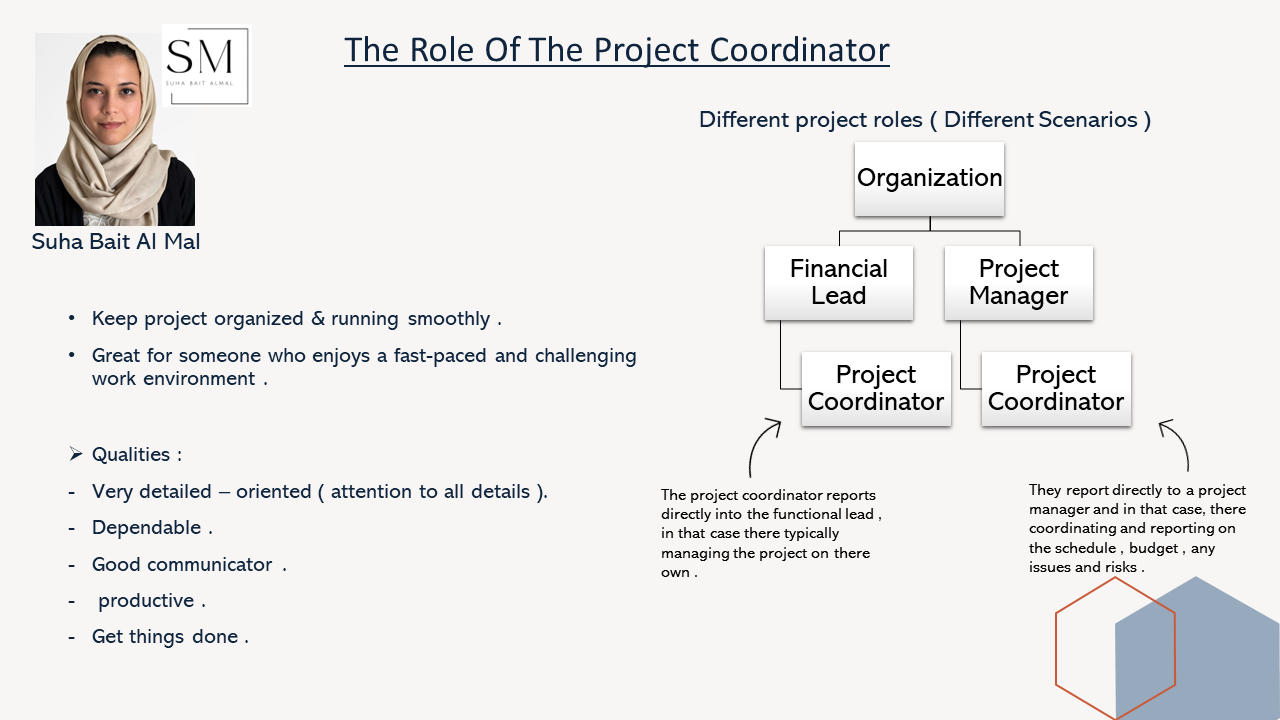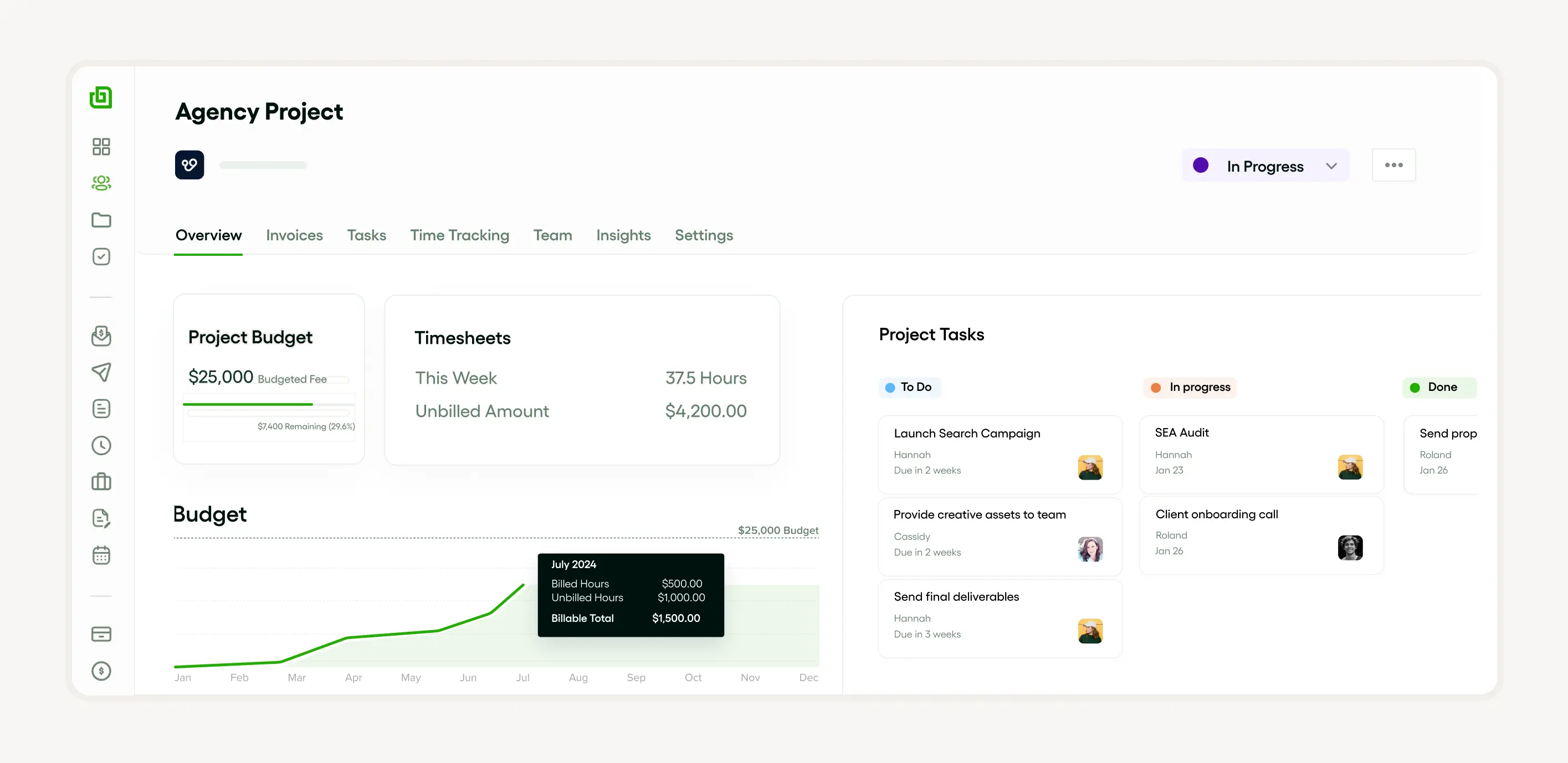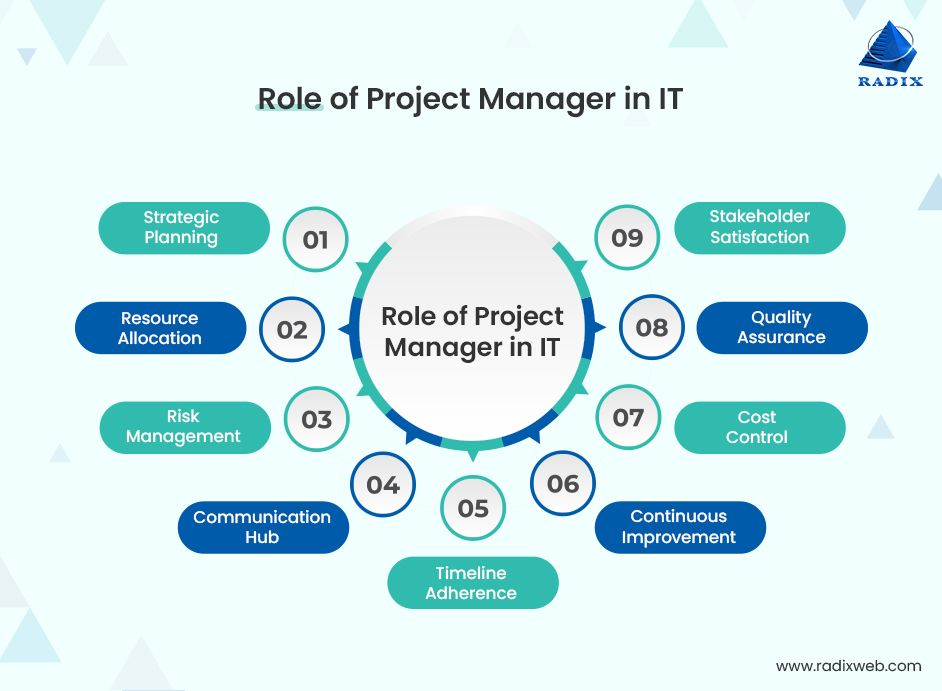A Project Manager and Project Coordinator serve distinct roles in project management.
The Project Manager heads the undertaking of work on the project, such as the scope of a project, the identification of project risks, and a decision on how the project budget will be managed. The Project Manager brings project management experience to the project. They are the ones responsible for the success or failure of a project, including project scheduling as well as coordination between the project team and stakeholders.
A Project Coordinator plays a supportive role, which includes tasks execution on projects, the management of project documentation, and helping in the communication of project requirements among the several project stakeholders. This role can be necessary to support the project management professionals at the possible making the projects move on smoothly.
Introduction to project management roles

Different management roles in project management play important roles in attaining the project's objectives. Three main roles are found in project management, including project coordination, tasks execution, and management of project stakeholders. Their work may overlap to the scope of a project, project schedule, and project budget management. The project roles further entail the identification of the project's risks and developing necessary mitigations, project requirement documentation, completeness of project documentation, and project team management. However, it takes highly skilled professionals in project management with vast experience in project management to excellently manage such roles.
Understanding the importance of project management
Understanding the importance of project management is vital for the attainment of project success in terms of project goals within the actual project schedule and project budget. Project management entails coordination in allocating project responsibilities and managing project tasks, leading the project team to focus on the project scope in order to meet the project requirements. Project management experts use their experience to identify and mitigate project risks. In addition, they make sure there is efficient communication with the project stakeholders and the completeness of the project documentation. In other words, project management is a roadmap for all involved parties on the project, and it defines their roles and expectations.
Defining key project management roles
Project management encompasses various roles that perform different functions related to the project. The first and most crucial is the position of a Project Manager. Here is a professional who leads the whole project—project scope, project schedule, and project budget—it defines project risks and communicates with the stakeholders.
Another one-is the position of Project Coordinator. A project coordinator, in tandem with managing a project, provides support to the Project Manager in tracking and distributing project tasks, project documentation, and project departments. Project Coordinators also maintain project requirements to determine that they are compatible with the project scope.
And finally, the third key position is the position of Project Team Members. The role of this person is vital for the implementation of the project. According to the requirements of the project, they are selected and bring to the project significant experience in project management. These project positions as a unit help to obtain project success.
Deep dive into the role of a project manager
The role of a Project Manager is the focal point of project management because this position embraces numerous responsibilities. The work of a Project Manager includes the determination of project scope, outlining project tasks, and setting the project schedule. That is a critical role that implies developing project requirements, project documentation, and, of course, the project budget.
On the other hand, Project Managers are responsible for project risk management and smooth project coordination. Project Managers are responsible for leading a project team and sustaining active communication with project stakeholders. Of course, that is why a project management specialist must have a rich pool of experience in managing different projects.
Key responsibilities of a project manager
A Project Manager has the primary responsibility for effective management of every aspect of the project, which includes control and oversight. Some of the key project responsibilities include defining the project scope and maintaining it, planning and managing the project schedule, and preparing the project budget.
On the other hand, the Project Manager also identifies and manages project risks, manages the project team, ensures project stakeholders are informed about the progress and the changes taking place, validates project requirements, and maintains proper and complete project documentation.
A Project Manager also has a primary project role to play in task assignment and project coordination. These tasks are performed with a skill set that a project manager acquires from several years of project management practice and from continuous development as project management professionals.
Skills and qualifications required for a project manager
A Project Manager has a long list of project responsibilities, which includes managing the project team, setting and maintaining the project schedule, and managing the project budget. A strong sense of project management is required by him, and he also must have a deep knowledge of the project scope, project risks, and requirements of the project. He is expected to link the objectives of the project with the intentions of the project stakeholders and the team.
Skills are a prime requirement for managing, distributing, and reviewing project documentation to manage them efficiently in a project. Skills of team leadership, communication ability, and project management experience are also some key ingredients. By and large, they are certified project management professionals, as the position requires them to employ expertise in several project roles and tasks.
Tools and software used by project managers
Project management professionals employ several tools and software for effective management of project responsibilities. This may be project management software such as Microsoft Project, which enables them to track project activities, project schedule, project cost, and project scope, and the capability of managing project team collaboration.
Risk Management Tools are also a few other practical software. They are developed for identifying project risks, analyzing risk, and tracking their occurrence. Document Management Solutions enable the creation, storage, and distribution of project documentation for the purpose of defining project requirements, project roles, and for communication towards project stakeholders.
Exploring the role of a project coordinator

A project coordinator plays an integral role in project management. The coordinator is involved in every aspect of a project, including defining project scope, setting project schedules, and managing project budgets. They are responsible for coordinating project tasks, ensuring the project team meets project requirements and effectively communicating with project stakeholders.
The Project Coordinator also helps to identify and mitigate project risks, ensures all project documentation is maintained and updated regularly and often assists the Project Manager with various project responsibilities. Their complex role makes project coordination demanding, thus requiring solid project management experience and professional training.
Key responsibilities of a project coordinator
A Project Coordinator is integral to project management. They are tasked with organizing and controlling project tasks within set project schedules. This includes managing the project scope, schedule, and budget under the direction of the project manager. They must ensure the project stays within its intended course and pre-set boundaries.
Their project responsibilities also extend to coordinating team activities, conducting meetings, and facilitating communication among project stakeholders. They are accountable for tracking project progress, identifying project risks, and assisting in problem-solving. Furthermore, they maintain project documentation and ensure all project requirements are met.
Being a liaison between different project teams, vendors, and clients are among their unique project roles, requiring optimum project coordination skills. They might not be project management professionals, but their role necessitates gaining substantial project management experience.
Skills and qualifications required for a project coordinator
A Project Coordinator should possess strong project management skills with the ability to manage project responsibilities efficiently. A keen understanding of project scope, project schedule, and project budget is essential in this role. They should be competent in identifying project risks and preparing mitigation plans.
An ideal candidate must have good experience in project documentation, able to comprehend and communicate project requirements effectively to the project team and stakeholders. Moreover, solid project roles understanding and the capability to segregate project tasks adequately, ensuring project coordination runs smoothly is indispensable.
The Project Coordinator is expected to bring to the table relevant project management experience and must be able to collaborate well with other project management professionals.
Tools and software used by project coordinators
Project Coordinators utilize various tools and software to manage their project responsibilities effectively. These tools help them in project management, specifically in defining project scope, coordinating project tasks, controlling project schedule and budget, and managing project risks. Such tools definitely require considerable project management experience to use to their full potential.
Software like Bonsai, Microsoft Project, Asana, or Trello are used for task assignment and tracking, while tools like Excel or Tableau are used for project budgeting and risk assessment. Project Coordinators also rely on communication tools like Slack or Microsoft Teams for effective coordination with the project team and stakeholders.

Furthermore, software like SharePoint or Confluence is frequently used for project documentation, ensuring all project requirements and roles are clearly defined and easily accessible for all involved.
Comparing project manager and project coordinator
The roles of Project Manager and Project Coordinator are both critical to project management but carry different responsibilities. A project manager is typically in charge of the project's scope, project schedules, and project budgets. They have direct accountability for managing all project tasks, risks, and stakeholders. Their role requires both leadership skills and extensive project management experience.
On the other hand, a Project Coordinator assists the Project Manager and the project team by handling administrative tasks and coordinating project documentation. They ensure that project requirements are met, help manage the project schedule, and communicate with all project stakeholders. The role of a Project Coordinator is crucial for project coordination but requires less experience than project management professionals.
Comparing the responsibilities
Project responsibilities are likened to the working of the heart in project management. It will be very crucial to ensure that project roles are clear and that project tasks are assigned to a project team. Project management professionals are supposed to maintain a balance when it comes to approaches to the project schedule, the project budget, and the project scope. They also have responsibilities that include identifying potentials of project risk, and most important to that is communicating with the project stakeholders. It is also important to be able to adhere to the project requirements and create accurate project documentation. Hence effective project coordination that is channeled on project management experience that is solid will surely match a project success.
Comparing the skills and qualifications
The skills and qualifications of an individual in project management are quite major in the consideration of the success or failure of any project. Core competencies that one must exhibit will constitute proper handling of, that is, managing the project schedule, the project budget, foreseeing and mitigating project threats or risks, and defining the project scope. More so is the capacity to coordinate the project team, sure of clear roles and responsibilities, and therefore effective communication with project stakeholders. These abilities are an exhibition of depth in project management experience. Lastly, the capacity to interpret and manage project requirements, maintain detailed project documentation, and assign and track project tasks are all necessary skills for the project management professional.
Comparing the tools and software used
There exist different tools and software. There are various tools and software that are important in managing different aspects of project management such as requirements of the project scope, project tasks, and project schedule. A correct choice can make a huge difference with any project. Therefore, project management professionals must have experience with different tools through ensuring that project documentation is up to date and properly maintained. These tools help to ensure coordination among projects, which align project requirements with the project team as well as stakeholders. Further, it helps to keep the project on budget and at the lowest level of any associated risks for the project.
Choosing who to hire: Project manager or project coordinator

Whether to hire a Project Manager or a Project Coordinator is a decision made based on the size and complexity of a project. In some cases, a Project Manager is needed. Projects require a Project Manager when they are larger in size and more complex. These project managers have decent project management experience and take responsibility for overall project management, project responsibilities, and to manage the project budget.
On the other hand, Project Coordinator often deals with project specific tasks, project coordination, and communication between the project team and the project stakeholders. Project Coordinators may be more suited to smaller projects or may be used to support a Project Manager in larger projects. They ensure that the project schedule is kept and that project documentation is handled.
Knowing your agency's needs
Good project management is accomplished by effectively understanding an agency's needs. In general, this means defining the project responsibilities, having a realistic project schedule, and a reasonable project budget. Knowing the project risks and what the project scope will be before getting underway also helps.
In practical terms, an important element would be to assemble a project team while pinpointing the project stakeholders and explaining the project requirements. This will also allow you to complete project documentation fully, define project roles, assign project tasks, and coordinate the project well. Successful project management is both an art and a science. Your agency's success towards project management will be greatly enhanced by project management professionals.
Auditing the current team structure
Achieving good project management is by effectively understanding an organization's current project team structure, which will give a better understanding of project responsibilities for each team member. This assessment brings out a strategic organization of the project's tasks while distributing loads equitably and friendly to the project schedule.
Team structure must be assessed to help in determining the project roles relevant in fulfilling the project requirements. Additionally, project coordination dynamics can be realized from such an assessment. It is for this that eventually project risks can be minimized and help in project adherence to the budget. Here, then is the importance of project management professionals based on project management experience in the team structure assessment. Their expertise will be critical in mapping out an effective team structure – one that is friendly to the project's scope, the project stakeholders, and the project documentation needs.
Planning within your budget and resources
As far as project management is concerned, you need to plan with your project budget and resources in mind. Good Planning can efficiently help minimize project risks around the project's breach of the budget and project schedule. It will help in ensuring that the project's responsibilities are equitably distributed to the project team members and that no task is overdone.
The roles of the project management professionals stretch to overseeing and coordinating, among others, the necessary requirements of the project and the project documentation. These amount to the most critical elements in the project's scope, the projects' stakeholders, and, by extension, the overall success of the project. In planning, always remember that your project tasks should remain or move within the limits of the available resources. Therefore, always leave room for flexibility and change.
Conclusion: Making the right choice for your agency
The right choice for your agency thus depends, in large part, on proper project management. It involves defining project roles to the project teams, keeping and controlling schedules and budgets to the project and risk protection for the project. There should also be in-depth understanding of what scope of work that the project stakeholders agree to the project. Decisions are made for the project's requirement, project documenting and defining project roles. Guiding the team in the tasks that relate to the project and ensuring strong coordination of the project will lead to the success of the project. Your agency is bound to cover itself in glory when it has enough project management experience and is supported by project management professionals.






